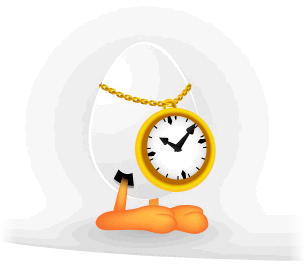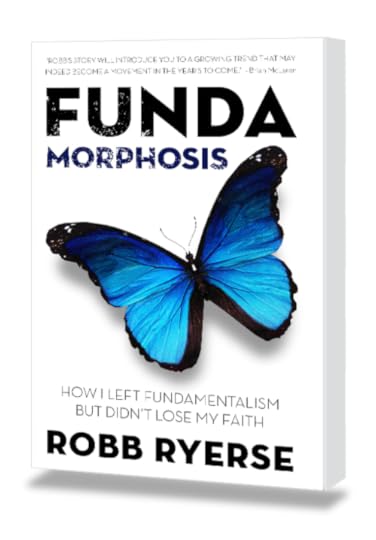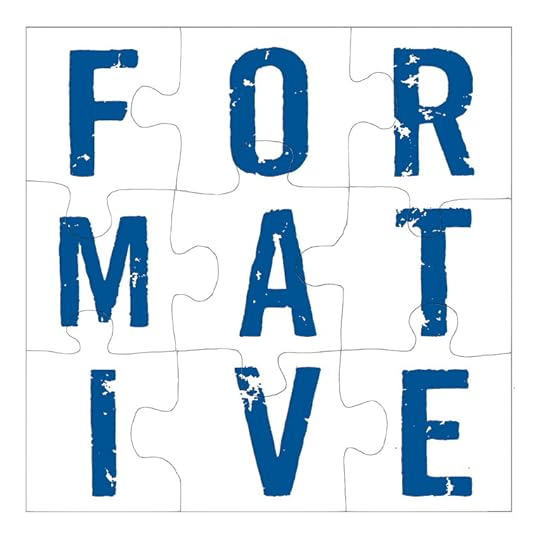Robb Ryerse's Blog, page 10
February 6, 2013
Fundamorphosis: the Podcast
My wife Vanessa and I have embarked on a new adventure. We are now podcasting. This week we launched the Fundamorphosis Podcast.
 My book, Fundamorphosis: How I Left Fundamentalism But Didn’t Lose My Faith is the story of my theological transformation. It tells the story about how I now believe differently than I used to. My theology takes a much different shape than it used to.
My book, Fundamorphosis: How I Left Fundamentalism But Didn’t Lose My Faith is the story of my theological transformation. It tells the story about how I now believe differently than I used to. My theology takes a much different shape than it used to.
My own fundamorphosis led to a major change in our church situation. The churches and denomination I grew up in were not safe spaces for me to question, doubt, wonder, and reevaluate. In fact, I had to hide my questions for fear of being shunned or fired. This led to a terrible crisis of faith in my heart and mind.
When we started Vintage Fellowship, we were committed (and still are) to providing a safe space in which people can be authentic – real about what they do or don’t believe, real about their questions and struggles, real about their theological explorations.
But Vintage, being located in a particular time and space, can’t be a community for everyone or anyone. Vanessa and I have wanted to replicate the community of safety elsewhere. We’ve wanted to carve out a safe space for people in any place and at any time can feel encouraged in their theological exploration.
That is how the Fundamorphosis Podcast was born.
It’s a place where grace happens, where questions get asked, where people can realize that they are not alone.
On a somewhat weekly basis, Vanessa and I are going to be podcasting.
We’ll take some time to talk about what is on our mind – theology, church, parenting, pop culture, sports, television, whatever.
We’ll also take time each week to interview someone who has gone through some kind of fundamorphosis of their own. We want our listeners to know that they are not the only ones to ever wonder, doubt, and change. We’ve got some great guests already queued up!
And, each week, we’ll answer people’s questions. You can ask your questions via email (fundamorphosis @ gmail dot com) or by tweeting at us @fundamorphosis or by joining the Fundamorphosis community on Facebook.
Yesterday, we posted the first episode of the Fundamorphosis Podcast: Tickle and Women and Mark, oh my. We spent some time talking about Phyllis Tickle and the feminist reaction to her comments at Emergence Christianity 2013. We also interviewed our friend Mark Scandrette. We ended by answering some of your questions.
The audio isn’t perfect, but we’re working on improving that. And the podcast still isn’t showing up in the iTunes store, but if you subscribe to the podcast, it will download for you. Weird. We’ll get the hang of the technical parts eventually. We don’t know how long we’ll keep doing it for, but right now, we’re planning on at least 6-8 weeks. If we like and you like it, we’re likely to keep going.
Our hope is that you’ll be mildly entertained, occasionally challenged, and always encouraged to keep asking, seeking, knocking.
Here’s the feed to the Fundamorphosis Podcast. You can listen directly or subscribe to the podcast in iTunes by clicking here.
Thanks for being on this journey with us. It’s going to be fun.
The post Fundamorphosis: the Podcast appeared first on Robb Ryerse.
February 5, 2013
Episode 1: Tickle and Women and Mark, oh my
Robb and Vanessa kickoff the new Fundamorphosis podcast by talking about Phyllis Tickle and feminism, interviewing Mark Scandrette, and answering listeners’ questions.
The post Episode 1: Tickle and Women and Mark, oh my appeared first on Robb Ryerse.
Productivity Tools
I am always very interested in tools and ideas that can help me to be more productive and effective. It’s not that I’m not usually productive and effective. It’s that I usually have a lot of plates spinning in my life. I need to keep them all organized. I need to make sure I don’t forget stuff. I need to keep things from falling through the cracks.
And so I pay attention to leadership and management techniques. I try out different organizational methods. I set and reset and rereset goals. I make a lot of to do lists. And every once in a while I stumble across things that really help.
Recently, I’ve begun incorporating some new organizational and productivity tools into my routine. I thought I would share them with you.
 Reminders – Normally, I have one giant to do list of everything that I need to do. I try to keep this list so that I don’t forget anything. If I think of it, it goes on the list. I’ve blogged before about how in addition to this, I will often make a list of what I have to do today that will enable me to sleep well tonight. This system has worked well for me – except, I spend more time than I really want to writing and re-writing these lists. The page gets too full or too sloppy. I’ve got to transcribe it all. Until now.
Reminders – Normally, I have one giant to do list of everything that I need to do. I try to keep this list so that I don’t forget anything. If I think of it, it goes on the list. I’ve blogged before about how in addition to this, I will often make a list of what I have to do today that will enable me to sleep well tonight. This system has worked well for me – except, I spend more time than I really want to writing and re-writing these lists. The page gets too full or too sloppy. I’ve got to transcribe it all. Until now.
I’ve started using Reminders, an app on my MacBook that syncs with my iPad and iPhone. Reminders lets me create multiple to do lists. So, instead of one big list, I’ve got several big lists broken into categories, keeping track of everything I can think of that I need to do. My lists include categories such as Work, Home, Vintage, Fundamorphosis, and the Blog. But I also have a Today list. The best thing about Reminders is that I can start each day by simply dragging items from my different lists into the Today list. It lets me easily manage a doable Today list from the monster lists of everything I don’t want to forget. Everything gets remembered. Everything gets organized. Everything gets done.
 E.ggtimer.com – When it comes to getting stuff done, I’ve started using e.ggtimer.com. Each day, when I drag items to my Today to do list, I add a note about how long I think it will take me to get that thing done. 5 minutes. 20 minutes. 2 hours. When it’s time to tackle that project, I go to e.ggtimer.com and enter the time. And then I race myself to see if I can get it done in time. (Right now there are 34 minutes and 13 seconds on the clock for this blog post to be written and posted.) I do my best work when I have deadlines. They keep me from getting distracted and wasting time. E.ggtimer.com lets me create my own deadlines. In fact, I don’t even have to go to e.ggtimer.com, I can just type e.ggtimer.com/5minutes or e.ggtimer.com/1hour into my browser bar … and away we go.
E.ggtimer.com – When it comes to getting stuff done, I’ve started using e.ggtimer.com. Each day, when I drag items to my Today to do list, I add a note about how long I think it will take me to get that thing done. 5 minutes. 20 minutes. 2 hours. When it’s time to tackle that project, I go to e.ggtimer.com and enter the time. And then I race myself to see if I can get it done in time. (Right now there are 34 minutes and 13 seconds on the clock for this blog post to be written and posted.) I do my best work when I have deadlines. They keep me from getting distracted and wasting time. E.ggtimer.com lets me create my own deadlines. In fact, I don’t even have to go to e.ggtimer.com, I can just type e.ggtimer.com/5minutes or e.ggtimer.com/1hour into my browser bar … and away we go.
 Evernote – I realize that I am late to this party. But I have started using Evernote as an app on my Mac, iPad, and iPhone. I’ve got it set up with notebooks for all of the different things going on in my life. I have the web clipper extension installed in Chrome so that I can save webpages and articles that I want to read or reflect on later. I’ve got it synced with my calendar so that when I want to take notes in a meeting, it knows what I’m doing. Evernote has moved out of obscurity and into my dock. And I can’t imagine it going back any time soon.
Evernote – I realize that I am late to this party. But I have started using Evernote as an app on my Mac, iPad, and iPhone. I’ve got it set up with notebooks for all of the different things going on in my life. I have the web clipper extension installed in Chrome so that I can save webpages and articles that I want to read or reflect on later. I’ve got it synced with my calendar so that when I want to take notes in a meeting, it knows what I’m doing. Evernote has moved out of obscurity and into my dock. And I can’t imagine it going back any time soon.
Email – I’m trying to only check my email a few times a day. This may be the hardest change I’ve been trying to make! I’m used to refreshing my email over and over. My work mail has always been open. My gmail tab has always been open. Email distracts me from other things I need and want to get done. So … I’m working on checking my email only a couple of times a day, but also emptying my inbox when I do. I set myself time on e.ggtimer.com and then get it all handled.
In addition to all of this, I’ve been thinking a lot about a video I saw of Bill Hybels talking about his 6×6 method of leadership. I’m intrigued. I also follow Seth Godin and Michael Hyatt daily. They inspire me.
And … I’m seriously considering hiring a virtual assistant. I’ve read a lot about people who have been able to outsource a lot of mundane but necessary tasks so that they can be more free to focus on what they have to do and want to do. I feel this pressure. I think I’ve got a number of projects, especially related to my book and personal life, that could easily be done by someone else. But I’m not quite sure where to start or what to expect. I’ve got a phone call tomorrow with a virtual assistant company to get more information. My guess is that it will be way out of my price range. But … you never know.
These are some of the things I’m doing to be more productive and effective, organized and efficient. How about you? Any tricks or apps or experiences you’d like to share with all of us?
The post Productivity Tools appeared first on Robb Ryerse.
January 30, 2013
Formative: Telling the Truth by Frederick Buechner
When we lived in Michigan, I started a group called the Pastors Theology Roundtable. Every other month, several of us pastors from around the state would get together to talk theology. Often, one of us would present a paper about some off-the-wall theological idea we had – and the others would shoot holes in it. For a bunch of theology nerds, it was great fun.
 One month, we read a book together, Frederick Buechner’s Telling the Truth: The Gospel as Comedy, Tragedy, and Fairy Tale. It’s a short book about preaching. Something about it captured my imagination, maybe because it was so very different from every other book about preaching that I had ever read … I just don’t think I understood it at the time. But I loved it nonetheless.
One month, we read a book together, Frederick Buechner’s Telling the Truth: The Gospel as Comedy, Tragedy, and Fairy Tale. It’s a short book about preaching. Something about it captured my imagination, maybe because it was so very different from every other book about preaching that I had ever read … I just don’t think I understood it at the time. But I loved it nonetheless.
When our pastors group got together to talk about it, we struggled a bit. I think we got hung up on Buechner’s use of the word “truth.”
We were fundamentalists. We had grown up being taught – and continued to teach to our congregations – that truth gets capitalized. Truth. We thought of truth as an objective, propositional, absolute thing. Truth was an object that could be handled and examined. It was something that could be accepted or rejected. It was its own thing, present in the world.
When I read Buechner saying that I need to “tell the truth” when I preach, I instinctively imported my own understanding of Truth into his book. I heard again that I needed to present propositions about God and life and eternity in my sermons.
And I completely misread Buechner.
Buechner didn’t use the word “truth” like I was used to hearing it used. Rather than talking about truth as a set of absolute propositions, Buechner used “truth” as a synonym for “reality.” Truth is your honest and accurate experience of life.
When Buechner was imploring preachers to “tell the truth,” he wasn’t telling us to preach sermons with three logical points. He was begging us to be honest about ourselves, our lives, our struggles, our doubts. He was explaining that something powerful happens when we let people into the reality of our lives. Rather than shielding ourselves behind a set of propositions, the act of preaching is an opportunity for the preacher to become vulnerable and authentic before God and the congregation, thereby inviting the congregation to do the same.
Truth is reality. Truth is authenticity.
I’m not sure when this lightbulb went on for me. But when it did, I gained a whole new level of insight into and appreciation for Buechner’s book.
In my own book, I quote my favorite passage from Telling the Truth: The Gospel as Comedy, Tragedy, and Fairy Tale. It’s become formative for me as a preacher. Here it is again:
In the front pews the old ladies turn up their hearing aids, and a young lady slips her six year old a Lifesaver and a Magic Marker. A college sophomore home for vacation, who is there because he was dragged there, slumps forward with his chin in his hand. The vice-president of a bank who twice that week has seriously contemplated suicide places his hymnal in the rack. A pregnant girl feels the life stir inside her. A high-school math teacher, who for twenty years has managed to keep his homosexuality a secret for the most part even from himself, creases his order of service down the center with his thumbnail and tucks it under his knee. …
The preacher pulls the little cord that turns on the lectern light and deals out his note cards like a riverboat gambler. The stakes have never been higher. Two minutes from now he may have lost his listeners completely to their own thoughts, but at this minute he has them in the palm of his hand. The silence in the shabby church is deafening because everybody is listening to it. Everybody is listening including even himself. Everybody knows the kind of things he has told them before and not told them, but who knows what this time, out of silence, he will tell them?
Let him tell them the truth.
Get the whole Formative blog series here.
The post Formative: Telling the Truth by Frederick Buechner appeared first on Robb Ryerse.
January 29, 2013
Local, Organic, Pasture-Fed Sacred Cows Make the Best Hamburgers: Killing Our Small Group Ministry
I can barely contain my excitement about our new round of Experimental Collectives at Vintage. (I’ve written about them before here, here, here, and here.)

A little background: We had a traditional small group ministry – 8 or 10 people doing a Bible study together every other week. We realized that it was just boring and not really connecting with where we were at. We came to think that what people in our community need is not more knowledge of the Bible. What we need is more opportunity to put our knowledge to work. We need more activity, practice, and doing.
And so, we killed our small group ministry. Local, organic, pasture-fed sacred cows make the best hamburgers.
We replaced small groups with Experimental Collectives – six week gatherings of people to do something. In our heart of hearts, we as a community really want to follow the way of Jesus, to live the way Jesus is calling us to live. And our collectives help us to do that together.
We organized the teachings of Jesus around 5 big ideas:
- Authenticity - Jesus invites us to be the people God made us to be.
- Simplicity – Jesus invites us to see our stuff, money, time, anxiety, and worry differently.
- Purpose – Jesus invites us to engage with the broader world out there.
- Freedom – Jesus invites us to shed the bad habits and sins that are holding us back.
- Community – Jesus invites us to generative relationships with one another.
A collective meets every week for six weeks. But we don’t just study the big idea. We try to live it. We call our attempts at doing things “experiments” because sometimes they fail and sometimes they succeed, and we don’t want to foist guilt on anybody when they don’t work out. Also, we do them for a short time with an invitation to continue, but there is no shame in not continuing the practice. They are experiments.
For instance, during the round of Authenticity collectives, one group focused on how creativity helps them to be their true selves. They painted and visited a museum and wrote songs and read poetry. Or, during the Simplicity collectives, one group de-cluttered their houses and lives in search of greater peace of mind about their stuff.
This week, our Purpose collectives are getting started. There are three.
One collective is focused on service. They identified that most people have a real desire to be involved in their communities or neighborhoods, but for some reason, they have a hard time getting connected to local volunteer organizations. This collective is going to try to bridge that gap – giving people experience with volunteering and also helping them connect their passion with the a local organization.
Another collective is going to take the huge pile of stuff that was collected during the de-cluttering of the simplicity collectives and turn it into usable resources. They are going to figure out a way to sell it – garage sale, flea market booth, etc – and then use the money they make to meet some real needs – maybe funding some micro-loans in developing nations or helping a local family.
The third collective is planning on developing a broader understanding of people who are a part of different faiths. They are going to be visiting a mosque, a synagogue, an orthodox church, and a Hindu temple to observe and experience the practices of others. They are going to dialog with faith leaders to gain a better perspective on where people from other traditions are coming from. In so doing, the people in this collective will become better global and local citizens.
We’ve patterned our Experimental Collectives after Mark Scandrette’s book Practicing the Way of Jesus. Slowly, they are completely transforming us and our community. And I couldn’t be more excited about it.
The post Local, Organic, Pasture-Fed Sacred Cows Make the Best Hamburgers: Killing Our Small Group Ministry appeared first on Robb Ryerse.
January 28, 2013
Stop. Collaborate and Listen.
Vanessa got home very late – after midnight – on Friday night from hanging out with some of her girlfriends. By 12:30, we had started into a discussion that we had been avoiding for several days. When I use the word “discussion,” I mean “fight.” 12:30 in the morning is a terrible time to start a fight, but it was one we needed to have, and there is no time like the present, I suppose. We talked until after 3:00 am. And then we picked up again on Saturday morning when we woke up.
By the early afternoon on Saturday, we had made a breakthrough. We were able to see things from the other’s perspective. We had a bit more empathy for the other’s feelings. And we had a game plan for some things we’re going to do differently going forward.

One of those things is that I am going to find somewhere else to work a few days per week. For those who may not know, I work from home. I’ve done it for over a year now. It has a lot of advantages and perks that are really great. It has one significant downside. Vanessa and I are almost always together. And we get sick of each other.
Well, more accurately, she gets sick of me. She gets sick of me not necessarily because I am a miserable person to be around. And certainly not because she is some kind of witch. She gets sick of me because she is an introvert who desperately needs alone time to recharge her batteries and best engage with the world.
Since leaving our old fundamentalist life, we’ve worked really hard at making sure that Vanessa has a life of her own outside of me. She is a person in her own right and needs the dignity of a lifestyle that supports that. I’m too much in her grill right now. So, I’m going to be giving her space to breathe and think and pray and blog – without me always being there.
At the same time, in a rather ironic twist given what I’ve just written, we also realized that we need to collaborate more. We don’t need to work together, but we need to work on the same things. Vanessa and I are at our best when we are maximizing on our synergy. We draw out the best in each other. Some of the greatest things we have done in life and ministry have come from the powder keg of our collaboration.
So we decided to do a couple of things collaboratively:
First, the podcast that I was planning on launching will now be the podcast that we will be launching. We’re going to use it as a place to explore the idea of theological development and the evolution of beliefs. Going through a fundamorphosis was not something I did. It was something we did. We want to create another safe place in which people can think and doubt and learn and develop. A main part of it is that we’re going to interview some people about their own theological evolution. We’ve got some interviews lined up, and we get started this week. I’m hopeful that we’ll actually post the first podcast by early next week. We’re pretty energized about it.
The keyword in this last paragraph is “we.”
We also are going to begin working on a writing project together. We’ve talked for awhile about writing a book on marriage. We’ll get to that eventually. But we’ve decided to begin work on a project about church planting. A pink-and-blue look at what it’s like to start a church. A church planting handbook for couples. We’ve identified about 50 topics related to church planting about which we each are going to write 500 words.
So many church planting resources are only from the perspective of men. Giving voice to Vanessa’s perspective, especially in dialog with mine, we think has some real potential to be something. We’re not sure yet the best format to make available what we write. It might be a blog. It might be a book. It might be both. We’re figuring that out.
Again, the keyword is “we.”
The post Stop. Collaborate and Listen. appeared first on Robb Ryerse.
January 22, 2013
Formative: Biblical Theological Seminary
At my Bible college, all the senior guys had to take and pass an oral theology exam to be able to graduate. For a variety of reasons, I was asked to take mine publicly – anyone could come and watch and get a sense of what the oral exam would be like. As a thank you, I guess, for taking my orals this way, the Bible department of the college took my friend Aaron and I along with them when they went to a regional gathering of the Evangelical Theological Society at Valley Forge Christian College.
Without exaggeration and even though I had no idea until years later, I can say that it was a life-changing weekend.
ETS is like a conference for theology nerds. Academics present papers and answer questions. Think Comicon for Bible scholars. It was at this ETS gathering that I first heard the word “postmodernism.” Dr. Robert Newman presented a plenary session paper on the challenges and opportunities of postmodernism. I was intrigued. It was so over my head and yet so exactly what I already thought. Dr. Newman taught at Biblical Theological Seminary. It was the first time I heard that name too.
A few months later when I graduated, I had to make some decisions about going to seminary. I felt a good deal of pressure to attend the seminary associated with our college. But I also felt an internal yen to go elsewhere. I wanted to go somewhere different, somewhere where I would be challenged, somewhere with a fresh voice and a new perspective. I had also begun pastoring my first church, and so I needed to go somewhere that would fit with my schedule.
90 minutes away from our home on Staten Island was Biblical Theological Seminary in Hatfield PA. I remembered how much I had liked Dr. Newman’s paper at ETS. And when Vanessa and I visited, it felt like a place where I could think for myself, be challenged, and yet still be able to pursue my first pastoral ministry.
Going to Biblical Theological Seminary turned out to be one of the most important – and best – decisions I have ever made in my life.
At Biblical, I met some great people – including Doc Newman, Dave Dunbar, Charles Zimmerman, Tom Taylor. And I met John Franke. John introduced me to the writings of Stanley Grenz. In Grenz, I found a theologian with whom I could profoundly identify. His approach – seeing the integrative motif of the Bible as a story of community being reestablished by God’s grace – revolutionized how I read the Bible. I also got familiar with people like Wolfhart Pannenberg whose thinking would eventually shape both my eschatology and the trajectory of my theology.
 And, at Biblical, I met friends like Steve Arnold, who gave me an opportunity to move to the Boston area and cut my teeth in a creative pastoral ministry context. When I think about the church I now pastor, I can see how it is the logical extension of the youth group we started in Boston.
And, at Biblical, I met friends like Steve Arnold, who gave me an opportunity to move to the Boston area and cut my teeth in a creative pastoral ministry context. When I think about the church I now pastor, I can see how it is the logical extension of the youth group we started in Boston.
At Biblical, I learned that orthodoxy can be generous, that being reformed doesn’t have to equal being mean, and that we have much to learn from one another. Unity can exist when uniformity doesn’t. I also learned from Biblical’s example that fundamentalism isn’t the end, that you can grow from where you once were to something much more relevant and contemporary.
Biblical Theological Seminary was one of the most formative places I have ever been in my life. Without it, I would not be who I am today.
Get the whole Formative blog series here.
The post Formative: Biblical Theological Seminary appeared first on Robb Ryerse.
We Have a Winner!

Congratulations to Lacey Wiseman, winner of a free copy of my new book Fundamorphosis: How I Left Fundamentalism But Didn’t Lose My Faith. Lacey got entered to win by signing up to receive my very occasional newsletter.
Just because Lacey is the winner doesn’t mean the rest of you are losers. You can still sign up to get my newsletter – right over there, below my picture.
And … you can still get your own copy of Fundamorphosis on Amazon by clicking here.
Congrats, again, Lacey.
The post We Have a Winner! appeared first on Robb Ryerse.
January 21, 2013
Extreme Makeover: Theology Edition
When we had cable, we used to enjoy watching redecorating shows like Trading Spaces. While it was fun to watch how the designers would execute their ideas and how the homeowners would react, I was always left wondering one big question – what about the rest of the house?
Imagine that your living room gets some amazing, colorful, or wacky makeover and now it completely clashes with everything else in your home. (Like in the picture – where one designer glued straw to the wall in someone’s living room.) One room, the straw notwithstanding, has the touches of a design professional and skilled craftsman all over it, while the rest of the house is still sporting items from the Walmart clearance aisle. At least when you were decorating your house by yourself, there was some consistency to it. Now, one room is different and the rest of the rooms are, well, not.
I imagine that this kind of predicament would motivate people in a couple of ways. Some, I guess, would go through the makeover experience, see its results as well as the effort needed to achieve them, and be completely intimidated to ever try to it themselves. In my mind’s eye, I can see the house existing with its woefully inconsistent decorating scheme for years. In time, I would guess, the people living there just grow used to it and fail to notice it any more – or eventually change it back.
I would also imagine that experiencing a decorating makeover of one room would motivate other people to tackle every room of their house in the same way. They would look at their professionally decorated room as an inspiration, a roadmap, for how the rest of the house could be. Rather than just living with the inconsistency, they would think to themselves, “If the designer figured out how to make our room new and amazing, we can figure out how to do it with the rest of the house.” They would go room by room, and in time, they would have a whole new house.
I think this is the kind of thing that happens in people’s theological development too.
People undergo theological makeovers for all sorts of different reasons. Some go through a tragic circumstance – a divorce, a cancer diagnosis, an abusive situation – that shakes the foundations of what they always thought they knew. Others read a book or meet a person that give them a whole new perspective. Some people simply mature and need a faith that can mature with them.
Normally when these theological makeovers happen, they impact one belief at a time. A person might being to think of God differently. Or they might come to a different understanding of what the church ought to be like. They might question what they’ve always been told about the Bible. Or they might begin to accept God’s grace in their lives.
When this happens, as I imagine it does on makeover TV shows, some people only rethink one aspect of their beliefs, failing to see how it is now out of sync or inconsistent with everything else they believe. Others, however, are willing to rethink and redecorate everything, bringing it all in line with a coherent theological aesthetic.
My fundamorphosis has profoundly revolutionized both what I believe and how I believe. And I’m trying to be in the second group of people – those who let one makeover lead to another. I think differently now about God, church, the Bible, sin, human sexuality, politics, the future, gender, family, parenting – just about everything. Room by room, belief by belief, I’m exploring, thinking, and moving toward a much better – and more beautiful – theology. I hope you are too.
Has changing one of your beliefs led you to rethink something else?
The post Extreme Makeover: Theology Edition appeared first on Robb Ryerse.
Reminder: Win a Free Copy of My Book
Today is the last day to enter to win a free copy of my new book Fundamorphosis: How I Left Fundamentalism But Didn’t Lose My Faith. All you have to do is sign up to receive my newsletter. You can do that right over there, in the form on the right side of my website.
Don’t worry – I’m not going to send the newsletter out often. Trust me; I won’t spam you. Every once in a while, I’ll send you a newsletter with some updates about what I’m up to – on this site and in my life.
So … sign up today and get entered to win a free copy of Fundamorphosis.
The post Reminder: Win a Free Copy of My Book appeared first on Robb Ryerse.






